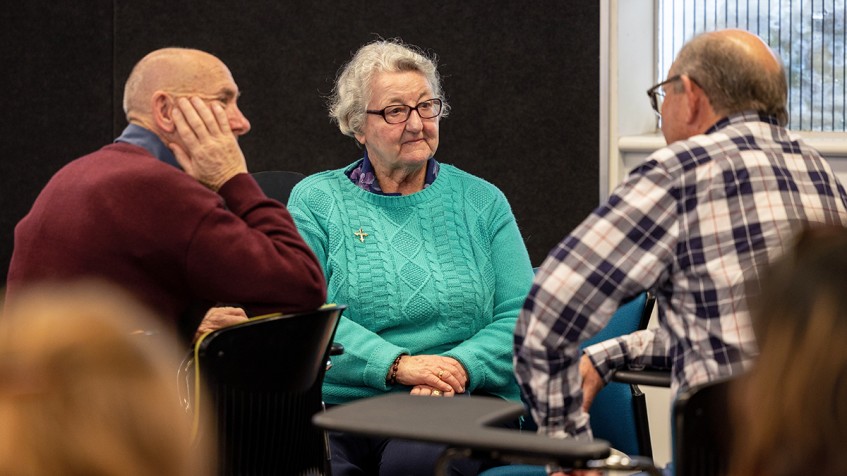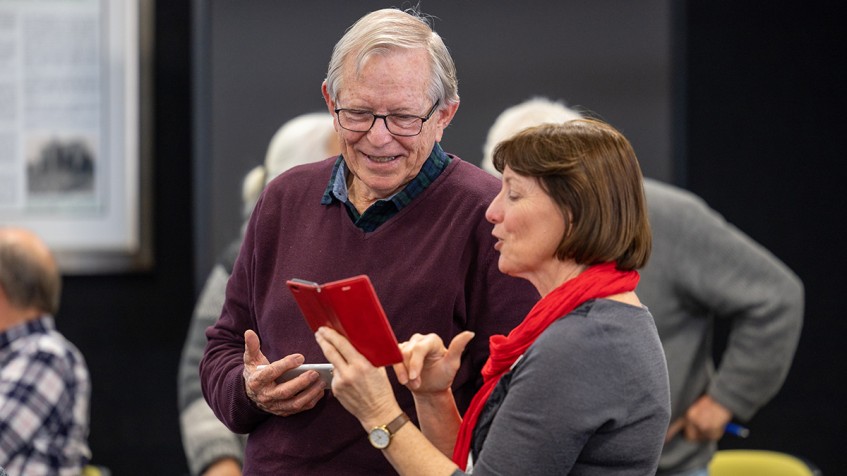News & Events
-
Latest News
- World Youth Day Cross and Icon to inspire youth at the Australian Catholic Youth Festival
- Call to support the Peter’s Pence appeal in 2025
- Bishops release new evangelisation resource
- Conference President, VP attend Papal Inauguration Mass
- Bishops welcome Youth Festival as opportunity for growth in faith
- Archive
- The Record Magazine
- Events
- Photo Gallery
- Video Gallery
Plenary Council: A Joyful, hope-filled, servant church wraps up thematic paper face to face
St John of God Health Care Group Manager of Mission Integration WA Tara Peters who led a recent Plenary Council seminar on 29 July, explored one of six PC themes ‘A Joyful, hope-filled, servant church.’ Mrs Peters offered three key reflections based on the theme – A posture of listening and dialogue, a vision of being moved by the reality around us, and a dare to embrace service as an encounter with God.
By Amanda Murthy
The important role that joy, hope and service play in a mission-focussed Australian Catholic Church that responds to God’s call of love – was explored at the sixth and final Plenary Council thematic paper seminar, held at Newman Siena Centre on Thursday, 29 July.
The Perth Catholic community spent the afternoon in prayer, dialogue, and discernment, answering the question, ‘How is God calling us to be a Christ-centred Church in Australia that is a joyful, hope-filled and servant community?’
St John of God Health Care Group Manager of Mission Integration WA Tara Peters, who led the seminar, began by highlighting key points that drew from resources including the PC thematic papers, Scripture, Instrumentum Laboris – Mrs Peters began by providing her personal reflection and offered three key points which she says emerged from this theme of the PC.
“The three reflections which I would like to share with you today are: A posture of listening and dialogue, a vision of being moved by the reality around us, and a dare to embrace service as an encounter with God.”

Perth Catholics gathered for an afternoon of prayer, discernment, and dialogue to explore one of six Plenary Council themes A Joyful, hope-filled, servant church. The seminar was held at Newman Siena Centre on 29 July. Photo: Max Hoh.
Drawing on the Scripture passage 1 Corinthians 12:12 to 27, Mrs Peters said that it is important to value each person with respect, dignity, and love to make up the church’s servant community.
Quoting Pope Benedict XVI first Encyclical Deus caritas est (God is Love), Mrs Peter stated that “Love of neighbour, grounded in the love of God, is first and foremost a responsibility for each individual member of the faithful, but it is also a responsibility for the entire Church at every level.”
“In the Pastoral Reality topic in the PC thematic paper, it is stated that many people today no longer simply accept what the priest [Church] tells them - they question, they challenge, and when their questions and challenges are not met with dialogue, they walk away.”
Mrs Peters said that this is where we can have the opportunity to adopt a posture listening and dialogue where we can “generate further reflection” on important matters.
“From the story of Jesus on the road to Emmaus, we can learn so much about the culture of listening and dialogue,” she said.
“Disciples were grieving the death of Jesus and trying to make sense of the story they had heard from the women who discovered His empty tomb. When Jesus came along, He listened to the conversation and didn’t jump straight in with the correct version of events.
“Jesus asked the disciples opinions, He noticed what was not being said, He listened to the story trying to understand their perspective (knowing that He held a different perspective), then He shared His truth,” Mrs Peters added.
“It was through this respectful dialogue and the actions of Jesus that the disciples’ eyes were open to a new understanding.”

Seminar attendees share their thoughts and reflections based on a photograph they store in their phones, as part of an activity at the recent Plenary Council seminar, held at Newman Siena Centre on 29 July. Photo: Max Hoh.
Drawing on her second point, ‘a vision of being moved by the reality around us,’ Mrs Peters remarked that “Mission was not made for the Church, but instead the Church was made for mission.”
Pope Francis in his book ‘Let us Dream,’ talks about the importance of working for a healthy world.
“It’s not about us getting ourselves right in isolation, we can’t completely flourish if the world is not flourishing,” Mrs Peters.
“What the Lord asks of us today is a culture of service…But we can’t serve others unless we let their reality speak to us. To go there, you must open your eyes and let the suffering around you touch you, so that you hear the Spirit of God speaking to you from the margins.
“The focus of our service can never be on mere actions, that is, the things we do. The focus of our service is on seeing people and valuing them as humans - not just the objects or recipients of our good deeds,” she added.
Speaking on her third point ‘dare to embrace service as an encounter with God,’ Mrs Peters said this reminds us that our “work of service needs nourishment from the Scriptures and from the grace of the Sacraments, lest the Church can become, as Pope Francis put it: “a sort of NGO stripped of the luminous mysticism.”
Summing up the seminar, Mrs Peter offered her hopes for the Church of Australia.
“This National theme for discernment is inspired by the voices of the People of God who expressed a yearning for the Church to be a sign of God’s kingdom for all people in Australia – to be able to see the Catholic Church in action, and to recognise Jesus,” Mrs Peters cited.
“As Pope Francis says – God asks everything of us, yet at the same time He offers everything to us.”
